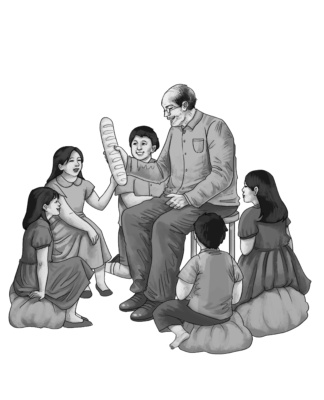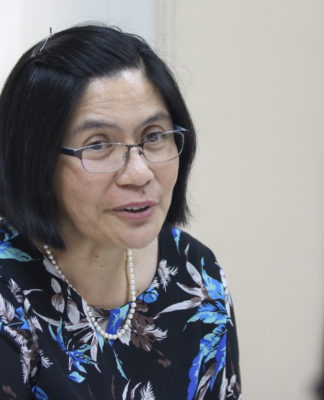UST RECTOR Fr. Ernesto M. Arceo, O.P. urged Thomasians to support candidates who are advocates of the “culture of life” and who have moral credibility.
“What I want the University to do this coming election is to thoroughly scrutinize and assess the candidates and vote for the ones who are pro-life, pro-justice, pro-country, and who adhere to morality,” Arceo told the Varsitarian. “These are the characteristics that I want UST to look for in every candidate.”
He also cautioned Thomasians against voting candidates who are advocates of “anti-life and anti-family” practices such as abortion, artificial contraception, divorce, and euthanasia, and candidates who have a history of graft and corruption.
Arceo said that having family values is a key trait that every candidate must possess.
“It is also highly important for candidates to be good wives or husbands, and good fathers and mothers since it is a reflection of what kind of persons they are,” Arceo said. “If candidates commit adulterous acts such as having multiple wives or husbands, how will he guarantee voters that he would not do something immoral once he is elected into office?”
“A candidate’s ability to look after his family is like a reflection or measure of how well he can govern the country,” the UST rector said. “If a candidate cannot even properly lead his family or his home, then he should be considered unfit to lead since (leadership) involves a larger scale of governance.”
He said that aside from values, a candidate must also have leadership qualities and a good track record.
“I urge Thomasians to do their homework on the candidates and be vigilant this coming elections,” he said.
Additional guidelines
Boosting Arceo’s call for discernment among the Thomasian electorate, the Parish Pastoral Council for Responsible Voting (PPCRV), a Roman Catholic electoral watchdog, issued 10 guidelines for responsible voting and candidacy last March 5.
The PPCRV, with the support of the Catholic Bishops’ Conference of the Philippines (CBCP) and the National Movement for Free Elections (Namfrel), underscored the need for voter to “know the moral integrity, capabilities, and other personal qualities” of candidates running for public office. These qualities, PPCRV said, will determine the candidates’ policy orientation toward highly sensitive issues such as the promotion of life, family values, and ethical and effective leadership and public service.
More than scrutinizing a candidate’s background, the PPCRV also encouraged voters to cast a critical eye in “understanding the issues, platforms, and programs of candidates” so that “the welfare of the country above all else will be properly realized.”
Moreover, the PPCRV urged candidates to campaign on issues, platforms and programs of government that will address the needs of the people.
Legislators and politicians have clashed on initiatives on poverty alleviation through population control.
The 13th Congress nearly passed House Bill 3773, the Responsible Parenthood and Population Management Act, which sought to limit Filipino families to only two children.
But pro-life and anti-population control lawmakers succeeded in blocking the passage of the bill, arguing that the bill in effect looked at population growth as the cause of Philippine poverty, when studies would tend to show that the impact of population growth on the economy is positive and that the country’s poverty is actually caused by mismanagement and corruption.
Moreover, pro-life lawmakers argued that HB 3773 seeks to promote fertility control through contraception and even abortion.
Last Feb. 5, Pro-Life Philippines exhorted voters to pick candidates who are capable of defending life and pushing for more humane legislation in Congress.
Manila Auxiliary Bishop Broderick Pabillo noted in his homily during the opening mass of the convention that to uphold the value of life is not a burden “because it is a gift from God.”
“It is when there is life that there is future. We try to look for candidates who are pro-life, so that life can be respected, can be promoted,” Pabillo said.
During the convention, a “Covenant for Life” was signed by Church leaders and political candidates who are “pro-life, pro-family, and pro-Filipino.”
Non-endorsement
Arceo also said that he, like the rest of the Catholic Church and the University as a whole, would not publicly endorse a candidate since it would cause divisions in the Church.
“It is not practical for the Catholic Church to officially endorse a candidate since it causes division in our ranks. We talk about our preferences but only in private,” the UST rector said.
He added that whoever is elected into office should focus on the eradication of immoral practices such as fixing, bribery and “under the table deals” in public service.
Father Arceo’s position was consistent with the refusal of the Catholic Bishops Conference of the Philippines (CBCP) to back any candidate in the May polls. The CBCP officialdom said that openly backing a candidate would be “pastorally unwise” and could be “politically counter-productive.”
CPCP president and Jaro Archbishop Angel Lagdameo said in a statement last March 13 that the bishops’ stand was part of its move not to dictate on voters whom to elect for “it is as bad as buying their votes.”
“To teach vividly and bring the faithful together around the values of the Gospel should be the main concern of the clergy,” Lagdameo said.
“We cannot endorse candidates at this point because involvement in partisan elections would undermine our role.”


















